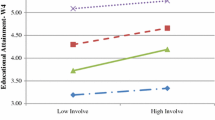Abstract
Latino toddlers fall behind White peers at 24 months of age in oral language and interactive skills with their mothers in English or Spanish. But Latino children enter kindergarten with social skills that rival White peers, despite social-class disparities. We ask whether cognitive trajectories widen during the 24–48 month period, how these patterns differ for Latinos, especially Mexican–Americans, and whether similar gaps in social-emotional growth appear. We analyzed growth patterns for a nationally representative birth sample (n = 4,690) drawn in 2001, estimating levels of change in development from 24 to 48 months of age, focusing on Latino subgroups. The mean gap in cognitive processing for Mexican–American children, already wide at 24-months of age relative to Whites (three-fourths of a standard deviation), remained constant at 48 months. But differences in social-emotional status were statistically insignificant at both 24 and 48 months. Mexican–American mothers were observed to be equally warm and supportive relative to White peers during interaction tasks. Yet the former group engaged less frequently in cognitive facilitation, oral language, and preliteracy activities in the home. Growth in both cognitive and social domains was considerably lower in larger families, placing children raised in poor or Spanish-speaking homes within a large household at greater risk of delays. Pediatricians and practitioners must carefully gauge the social-emotional well-being of Latino children, in developmental surveillance activities. Growth in cognitive and social domains unfolds independently for children of Mexican heritage, even when raised in economically poor families.
Similar content being viewed by others
Notes
Culturally oriented developmental psychologists at times emphasize the interwoven nature of cognitive learning and the social context and utility of what’s learned by young children. That is, by separating the two domains, we are distracted by their interplay in how youngsters acquire knowledge that serves culturally appropriate social behaviors [12].
We examined correlations between parent and preschool-teacher reports of the focal child’s social behavior and emotional status for a second, smaller sample of children who had entered preschool. These paired correlations were moderate in magnitude (Pearson r’s equal between 0.20 and 0.35, depending on paired items). Focusing on parent reports allowed us to examine change over the 24- to 48-month period.
References
Fuller, B., Bridges, M., Bein, E., et al. (2009). The health and cognitive growth of Latino toddlers: at risk or immigrant paradox? Maternal and Child Health Journal, 13(6), 755–768.
Fuller, B., Bein, E., Bridges, M., et al. (2010). Maternal practices that influence Hispanic infants’ health and cognitive growth. Pediatrics, 125(2), 324–331.
Crosnoe, R. (2006). Mexican roots, American schools: Helping Mexican immigrant children succeed. Stanford, CA: Stanford University Press.
Galindo, C., & Fuller, B. (2010). The social competence of Latino kindergartners and growth in mathematical understanding. Developmental Psychology, 46(3), 579–592.
Bradley, R. H., Corwyn, R. F., Pipes McAdoo, H., & García Coll, C. (2001). The home environments of children in the United States, part I: variations by age, ethnicity and poverty status. Child Development, 72(6), 1844–1867.
Shonkoff, J., & Phillips, D. (2000). From neurons to neighborhoods: The science of early childhood development. Washington DC: National Academy Press.
Greenfield, P., Keller, H., Fuligni, A., & Maynard, A. (2003). Cultural pathways through universal development. Annual Review of Psychology, 54, 461–490.
Halgunseth, L., Ispa, J., & Rudy, D. (2006). Parental control in Latino families: An integrated review of the literature. Child Development, 77, 1282–1297.
Fuller, B., & García Coll, C. (2010). Learning from Latinos: Context, families, and child development in motion. Developmental Psychology, 46(3), 559–565.
McLoyd, V., Jayarante, T., Ceballo, R., & Borquez, J. (1994). Unemployment and work interruption among African American single mothers: Effects on parenting and adolescent socioemotional functioning. Child Development, 65, 562–589.
Jung, S., Fuller, B., & Galindo, C. (2012). Family functioning and early learning practices in immigrant families. Child Development, 83, 1510–1526.
Rogoff, B. (2003). The cultural nature of human development. New York: Oxford.
Nord, C., Edwards, B., Andreassen, C., Green, J., & Wallner-Allen, K. (2006). Early childhood longitudinal study-birth cohort user’s manual for the ECLS-B: Longitudinal 9-month–2-year data file and electronic code book. Washington, DC: National Center for Education Statistics.
Snow, K., Thalji, L., Derecho, A., et al. (2007). Early childhood longitudinal study, birth cohort (ECLS-B), preschool year data file user’s manual (2005–06). Washington, DC: National Center for Education Statistics.
Fuller, B., Bein, E., Kim, Y., & Rabe-Hesketh, S. Variation in Mexican-American toddlers’ early cognitive growth. Unpublished manuscript, University of California, Berkeley.
Livas-Dlott, A., Fuller, B., Stein, G. L., et al. (2010). Commands, competence, and cariño: Maternal socialization practices in Mexican American families. Developmental Psychology, 46(3), 566–578.
Bridges, M., Cohen, S., Walker, L., Yamada, H., Fuller, B., Mireles, L., et al. (2012). Bien educado: Measuring the social behaviors of Mexican American children. Early Childhood Research Quarterly, 27, 555–567.
Zigler, E., Gilliam, W., & Barnett, S. (2011). The pre-K debates: Current controversies and issues. Baltimore: Brookes Pub.
Acknowledgments
This study was funded in part by grant R40 MC 21517 to Dr. Guerrero from the U.S. Department of Health and Human Services, Health Resources and Services Administration, Maternal and Child Health Research Program. Berkeley team members were funded by this grant and the Institute of Human Development. Dissemination activities are supported by the McCormick Foundation.
Author information
Authors and Affiliations
Corresponding author
Rights and permissions
About this article
Cite this article
Guerrero, A.D., Fuller, B., Chu, L. et al. Early Growth of Mexican–American Children: Lagging in Preliteracy Skills but not Social Development. Matern Child Health J 17, 1701–1711 (2013). https://doi.org/10.1007/s10995-012-1184-7
Published:
Issue Date:
DOI: https://doi.org/10.1007/s10995-012-1184-7




